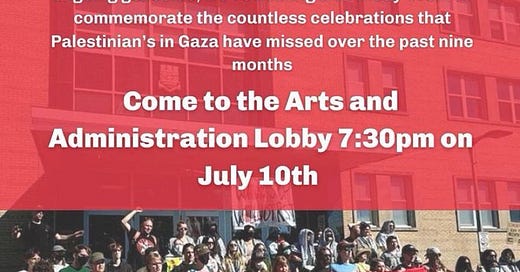It’s a cruel summer.
Alternating constant rain with heat and humidity randomly. and for political watchers, no rest from the lunacy of that field.
F’instance…
The crowd running Generic Canadian University - a.k.a Memorial - hauled down the couple of tents for the half-arsed pro-Hamas crowd and they just came back with an old-fashioned teach-in and the launch of indoor balloons for something the organizers called a birthday celebration.
As the night dragged on, the university threatened to sic the cops on them if they didn’t wrap up the gripping lecture on the “exterminatory colonial logic performed over Palestinian childhood.”
So they all packed up and left.
But…
the same crowd running GCU have added a new signature block to the bottom of official correspondence. It’s called a labor acknowledgement and reads:
We acknowledge the province of Newfoundland and Labrador’s connection to and participation in the Transatlantic Slave Trade including the building of slave ships and the selling of cod, deemed unfit to be sold to Europeans, for enslaved Africans’ consumption.
Labor acknowledgements are an American thing and as you can tell from the way this one at GCU is written, they are referring to a specific set of events that actually had very little to do with Newfoundland and Labrador directly even at the bitter end of the British involvement in slavery at about the same time that the population here exploded.
The Yanks have a reason to acknowledge the peculiar stain the Peculiar Institution has left across their society and that, in the words of one acknowledgement, “our country is built on the labor of enslaved people who were kidnapped and brought to the U.S. from the African continent and recognize the continued contribution of their survivors.”
The same is not true of Newfoundland and Labrador. Period. Sure people have made stuff up but it's made up. Even exaggerated does not come close to describing chunks of it including the references in the GCU email add-on to ships and salted cod. Cargo ships made in Newfoundland carried salt fish to markets, returned supplies here and in between a few carried other cargo, like humans. Putting it that way doesn’t diminish the inhumanity, horror , and brutality of the trade in enslaved labour. It actually highlights the immorality of it by demonstrating how utterly banal such a thing was to the people at the time.
But for Newfoundland and Labrador, it was marginal, tangential. This was a fishing enterprise, not even a colony, and it is remarkable for the near complete absence of enslaved Africans at any time during the British use of enslaved African people, roughly between 1660 and 1834. As noted here before, “English plantations in Newfoundland did not need enslaved Africans since they had plenty of cheap and free labour from other sources, all of which could be worked, beaten, abused, sold, traded, and in some instances killed without any consequence in the frontier called Newfoundland. The reason why people in some colonies worried of slaves escaping to Newfoundland from the rest of North America or the Caribbean is precisely because this was a frontier: a place where laws were hard to enforce.”
If GCU were not these days dominated by people whose thinking is racist and colonialist, they’d have noted this. They’d also have found an example of a sincere labor acknowledgement that lacks the blinkered, racist, colonialist thinking of the few words they chose. It is part of the labor acknowledgement quoted earlier:
We also acknowledge all immigrant labor, including voluntary, involuntary, trafficked, forced, and undocumented peoples who contributed to the building of the country and continue to serve within our labor force. We acknowledge all unpaid care-giving labor.
And in the key bit, it commits to “critically interrogate these histories, to repair harm, and to honor, protect, and sustain this land.”
That one is a lot less… what’s term… oh yeah… racist and exclusionary… than the GCU one, which suffers more than anything else from the inability of the people behind it to think critically let alone critically interrogate anything, least of all the history of the people of Newfoundland and Labrador. Their labor acknowledgement, like the pro-Hamas protests, the assault on the Ode to Newfoundland, or even the Indigenization policy come across as fraud, put-on, posing, and show. It is a form of Americanization, but without the heart to put their hands over.
Keep reading with a 7-day free trial
Subscribe to Bond Papers to keep reading this post and get 7 days of free access to the full post archives.





